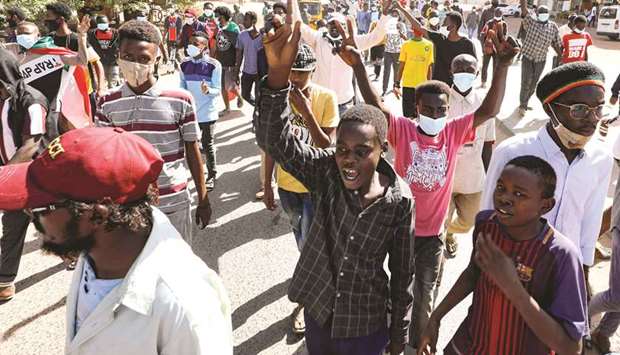Thousands of Sudanese protesters took to the streets of the capital Khartoum and its twin city Omdurman yesterday, demanding an acceleration of reforms on the second anniversary of the start of an uprising that ousted Omar al-Bashir.
The veteran leader was deposed by the military in April 2019 after months of mass protests against poor economic conditions and Bashir’s three-decade rule.
Many Sudanese are unhappy with what they see as the slow or even negligible pace of change under the transitional government that has struggled to fix an economy in crisis.
The government was formed under a three-year power sharing agreement between the military and civilian groups which is meant to lead to fair presidential and parliamentary elections.
Sudan’s state TV aired footage of thousands of protesters gathering outside the presidential residence in Khartoum which now hosts the sovereign council, a joint military-civilian ruling body.
The country also has a civilian cabinet of technocrats led by Prime Minister Abdalla Hamdok. “We have come out today, not to celebrate the anniversary or to congratulate the transitional government.
This government, unfortunately, over the past two years has not made any progress in the retribution file for our martyrs,” protester Waleed El Tom told the state TV in Khartoum.
Hundreds of Sudanese civilians were killed in protests before and after the former president’s ouster.
Yesterday, thousands more protesters gathered outside the abandoned parliament building in Omdurman, across the river Nile from the capital.
Small protests took place in other cities across the country, state media said.
At the top of the protesters’ demands is the formation of a long-awaited transitional parliament, part of the power sharing deal, to pass the necessary legislation for building a democratic state. Others called for the dissolution of the sovereign council, the cabinet and the ruling coalition. Sudan’s economy has worsened since Bashir’s removal, as the weak transitional government has failed to kick-start reforms and halt a fall in the Sudanese pound on the black market. “The Sudanese people had hopes that their revolution would be great, that it would achieve things, but today the Sudanese people are standing in bread lines,” a protester told state TV. Security was tightened in Khartoum and Omdurman but no major incidents of violence or casualties were reported. Social media users shared pictures and videos of protesters burning tyres and security forces firing tear gas. Reuters was not immediately able to verify the images.
Sudan’s government has signed peace deals with most of the rebel groups that caused unrest during Bashir’s rule, and it hopes that the United States’ recent decision to remove the country from its list of state sponsors of terrorism will help the ailing economy.

Sudanese demonstrators take to the streets of the capital Khartoum, to mark the second anniversary of the start of a revolt that toppled the previous government, yesterday.
